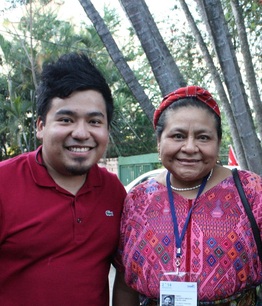 In Feb. 2014, Jorge Cuéllar served as an electoral observer in the Salvadoran presidential elections. Pictured with world-renowned indigenous rights activist Rigoberta Menchu.
In Feb. 2014, Jorge Cuéllar served as an electoral observer in the Salvadoran presidential elections. Pictured with world-renowned indigenous rights activist Rigoberta Menchu.
SalvCultura Editor Jorge Cuellar Goes to United Nations World Conference on Indigenous Peoples9/30/2014  In Feb. 2014, Jorge Cuéllar served as an electoral observer in the Salvadoran presidential elections. Pictured with world-renowned indigenous rights activist Rigoberta Menchu. In Feb. 2014, Jorge Cuéllar served as an electoral observer in the Salvadoran presidential elections. Pictured with world-renowned indigenous rights activist Rigoberta Menchu. On September 22-23, SalvaCultura news editor and doctoral student Jorge Cuéllar participated as part of a Yale delegation of indigenous students to the World Conference on Indigenous Peoples hosted at United Nations in Manhattan. As part of this excursion, Cuéllar served the role as observer of the deliberations and proceedings, and was witness to energetic and moving presentations by important political and indigenous leaders such as Rigoberta Menchu, Evo Morales, Oren Lyons, Enrique Peña-Nieto, Sauli Niinistö, among others.
0 Comments
Check Out These Central American Films at The San Francisco Latino Film Festival Sept. 19-279/19/2014
The San Francisco Latino Film Festival starts today Friday September the 19th and will be going on through to 27th. This year they will feature films from three Central American countries: Costa Rica, El Salvador, and Guatemala.
Central American Women Crossing Mexico Face High Rates of Sexual Abuse
An informative piece by Fusion asks “Is rape the price to pay for migrant women chasing the American Dream?” The articles notes that 80% of Central American women crossing Mexican territory on their way to the United States experience sexual assault. The scenario is something all too common, and largely goes unaddressed when talking about the migration experiences of Central Americans. In it’s opening line, the video article captures some of what entails women’s migratory experience, “Before they can reach the American Dream, many migrant women have to survive a Mexican nightmare.” Not every Central American woman makes it to the US, and in many Southern Mexico towns, there are local underground economies based on trapping these women into sex work. Watch the video and read the article here. Central American Experts Discuss the Root Causes of Border Crisis Melissa Harris Perry hosted a panel of Central American experts that included Héctor Perla Jr., Salvadoran-American professor at UC Santa Cruz and the Guatemalan-born researcher, Tomás Ayuso to discuss the origins of the present-day border crisis. This segment included a special focus on Honduras, the country with the highest outmigration of unaccompanied child refugees to the U.S. The conversation touched on the role of internal violence, police militarization, among others though the U.S.-supported 2009 Honduran coup d’état which established these political conditions went largely unmentioned. It was also emphasized that Central American states are becoming increasingly draconian and repressive in response to the escalating drug war in the region and U.S.-led initiatives like CARSI (Central American Regional Security Initiative). For El Salvador, asserts Héctor Perla Jr.: El Salvador's changing path after 2009, has begun to go away from heavy-handed policies. You see the impact it's starting to have. The increase of children from El Salvador hasn't been as nearly as much, and El Salvador has always been the largest of the senders. Salvadorans are now the 3rd largest Latino Community in the United States Watch the video here.
Indigenous Guatemalans Win Against Mining Company Last week, Upside Down World reported on the Guatemalan government ruling in favor of indigenous people of the Sipacapa municipality. The story shows us how the Guatemalan subsidiary of transnational Canadian mining company Goldcorp Inc. was granted a mining permit in Sipacapan territory without consulting and without consent of the people who rightly occupy those lands. The Mayan Council of Sipacapa immediately organized in response to save their land from the environmental destruction that mining often brings to indigenous territories. Though the peoples of Sipacapa achieved an important victory, this is but one of many battles required against the numerous operational mining projects in Guatemala. Transnational mining is a chief regional problem in Central America. Read the article here. Written and curated by Daniel Alvarenga and edited by Jorge Cuéllar Central American Children Humanize Their Struggle Before Congress Three Central American Children testified before the Congressional Progressive Caucus in Washington D.C. on Tuesday July 29th, 2014. The children were: Mayeli Hernandez, 12, migrated from Honduras last year in July of 2013; Dulce Medina, 15, came from Guatemala at five years of age; and Saúl Martínez, 15, from El Salvador, the most recent refugee from the group whom arrived in just April of this year. All of the children made their journey as unaccompanied minors. They shared their experiences of violence in Central America, their arduous journey through Mexico and into the United States, as well as the abuse and dehumanization they faced in U.S. immigration facilities upon arrival. Speaking directly to their time spent in the “ice-boxes” or unbearably cold holding cells without blankets or warm clothing, the children recounted how in some cases people would turn blue due to the slowing of blood circulation. Saúl Martinez had this to say, “Please don’t mistreat children the way your government has mistreated me. Finally, I want to ask you not to deport children like me because it’s very possible that you will deport them to violence and to their death.” Watch the full video here. "Why Nicaraguan Kids Aren’t Fleeing to the U.S.” San Diego radio station KPBS discusses Nicaragua’s absence from the unaccompanied Central American children debate. Nicaragua is one of the poorest countries in Central America, has a difficult history of war and violence yet doesn’t have masses of children heading to the U.S.-Mexico border. This article attempts to find the reasons for the Nicaraguan exception from this humanitarian crisis. The piece suggests the lower rates of criminal activity, community policing, the successes of the Sandinista revolution, and the individual decisions of many Nicaraguans to forego the American Dream for work, advancement, and stability in neighboring Costa Rica. Read the full article here. El Salvador Part of a United Latin American Front Against Israel El Salvador is one of five countries in Latin America, and the only one in Central America, to recall its ambassadors from Tel Aviv. El Salvador follows the example of Brazil, Chile, Ecuador and Peru who have done the same. It is worth mentioning that Cuba was the first Latin American country to sever ties with Israel in 1973. Venezuela and Bolivia both cut diplomatic ties with Israel in 2009. Argentina, Mexico, Nicaragua, and Uruguay have also condemned the Israeli assault but have not formally cut ties with the State of Israel. El Salvador, which has a sizeable Palestinian community living on its soil, continues to protest against Israel’s illegal military offensive in Gaza. The Salvadoran Ministry of External Relations recently stated, "This action is taken before the serious escalation of violence and implementation of indiscriminate bombing from Israel into the Gaza Strip that has killed children, girls, women and men.” Read the article in Spanish here. Co-written and co-curated by Daniel Alvarenga and Jorge Cuéllar |
ABOUTSalvaCultura is a portal for the Central American diaspora and their issues. Learn More. Categories
All
Archives
November 2016
|
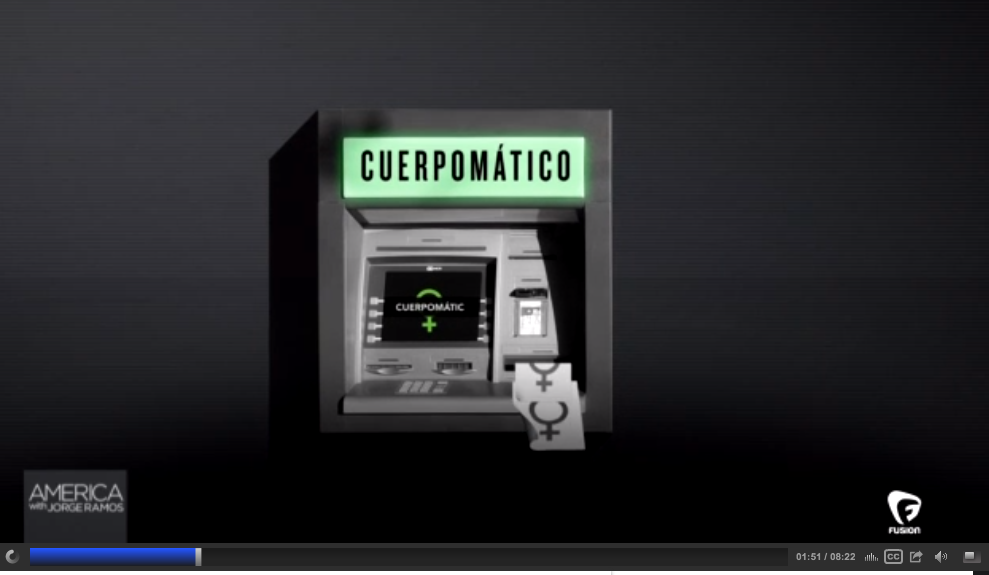
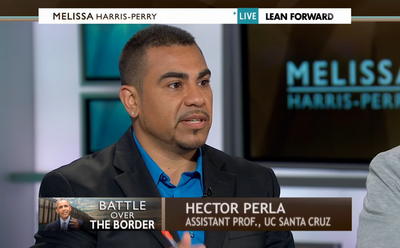
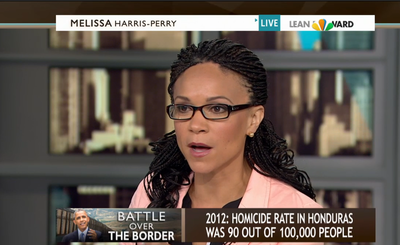
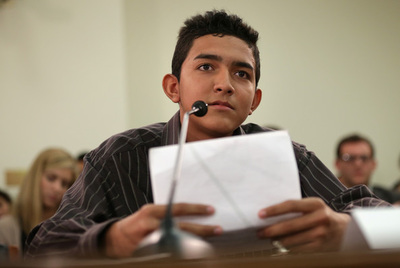
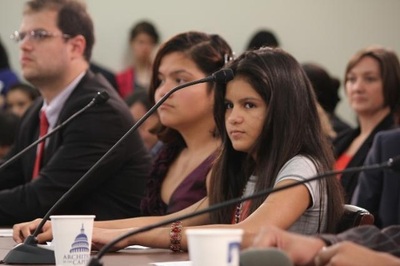
 RSS Feed
RSS Feed
